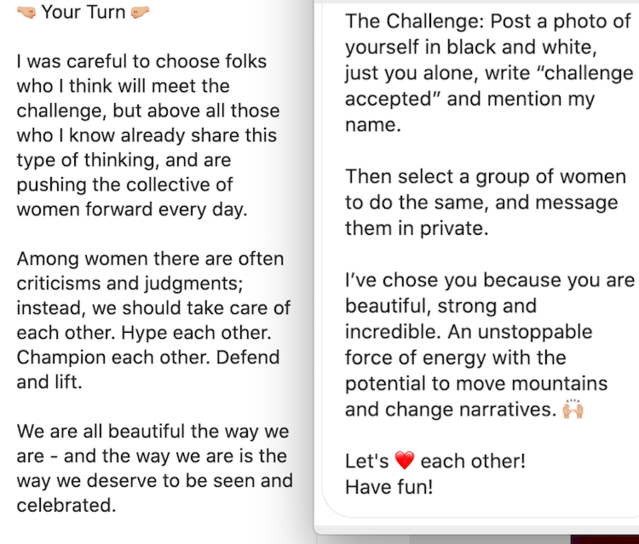Social Networking
#ChallengeAccepted Selfies by Women, I Call Your Bluff
Are these monochrome posts by women a feminist celebration or self-promotion?
Posted July 29, 2020

If you’ve looked at your social media feeds this week, you’ve surely seen them: black-and-white selfies posted by women with the hashtags #ChallengeAccepted and #WomenSupportingWomen with gleeful or gracious captions for the opportunity to be included in the campaign through the nomination process. At this point, a few questions popped up in my brain: What is the challenge here? What is the support? I didn’t give much more thought before dismissing them, pushing the questions down for more pressing content, like returning work emails, making a coffee and listening to my world news roundup, which is blissfully free of political commentary and criticism
Like many people, I have several accounts between my work life and personal life, so I saw these posts from a wide cross section of women. In fact, The New York Times reported that as of Monday, there had been over three million posts with this hashtag, and I’m sure it’s grown exponentially since. The posts on my feed were made by women who are close personal friends, women I know well outside of social media, women coworkers, old acquaintances, extended family members, and people whose lives I only know through social media, like celebrities and influencers. Once the posts started lingering at the top of my feed and multiplying for a couple of days, it happened: the invitation arrived in my Instagram mailbox.
I expected for my questions to be answered and to feel like there was a challenge and a supportive nature to the campaign because that’s what the posts seem to imply, and there were thousands upon thousands of women with whom the campaign had resonated.
It turns out, however, I am not one of those women.
I read the invitation and I have to be honest, the last thing I felt was challenged and supported.
Before I move on, it seems only fair that if I discuss the invitation, I should post it for full transparency, so below you will find a screenshot of the invitation as it was received, minus any identifying information about the sender, and I've also transcribed it below verbatim (including grammar issues and poor sentence constructions, which, considering I’m a writer, didn’t help matters much, but social media has never done wonders for proofreading.)

"Your Turn
I was careful to choose folks who I think will meet the challenge, but above all those who I know already share this type of thinking, and are pushing the collective of women forward every day.
Among women there are often criticisms and judgements; instead we should take care of each other. Hype each other. Champion each other. Defend and lift.
We are all beautiful the way we are – and the way we are is the way we deserve to be seen and celebrated.
The Challenge: Post a photo of yourself in black and white, just you alone, and write “challenge accepted” and mention my name.
Then select a group of women to do the same, and message them in private.
I’ve chose you because you are beautiful, strong and incredible. An unstoppable force of energy with the potential to move mountains and change narratives. (double high-five emoji)
Let’s <heart emoji> each other!
Have fun!"
I have to be honest: just typing that out and re-reading it made my eyes roll again. The first time I read it, I had a wave of disbelief and frustration. I was a bit irritated by the underhanded emotional manipulation going on, a little bit like when you're buying groceries (pre-pandemic) and the checker asks if you want to donate money to some benevolent cause and you must actively say no, I do not want to support this wonderful cause. I felt like if I didn't immediately take a black and white selfie, the implication was that I was not supporting women.
I have to admit I giggled aloud at the flowery language about mountains and narratives and energy. But then I started to question my cynicism. Was I missing something? Why were women falling for this ploy? Posting a selfie was a challenge? Posting a selfie was supporting women because it’s taking care of one another? I felt doubly awful because I felt like not participating in the campaign would hurt the feelings of the woman who sent the invitation. Was I not supportive of women? Then I realized, as I often do when I over-intellectualize things, that these questions were precisely the genius of the campaign. The reality I saw was that this campaign was the perfect ruse. A way to disguise a selfie as social activism, so it appears more noble. As Claire Lampen wrote today in The Cut, "this challenge now seems to be mainly about the poster lifting herself up."
The campaign provides women with an excuse to post a selfie. That's the challenge. As far as social causes go, most selfies require the almost absolute minimum amount of effort. To ostensibly be seen as an activist while also doing self-promotion that gives a person that boost of dopamine is the perfect marketing combo, driving women back to social media, waiting for more external validation of one's self-worth.
Though I doubt it’s known by the women posting these photos, the London Evening Standard has reported the resurgence of the #womensupportingwomen hashtag could have been a response to the sexist comments made by US Representative Ted Yoho about Alexandra Ocasio-Cortez. If the campaign is indeed to “lift and defend” as the invitation stated, why are these posts self-promotional and focused exclusively on one's own image and a vague notion of support. I decided to ask someone I know and love who chose to participate. I explained my reaction to the invitation over the phone. Her reaction confirmed my feelings. “I didn’t really think about that,” she said, “It was a fun excuse to post a pretty photo of myself.”
This is only one conversation, and it’s quite possible, I have missed something, and this is not a ploy and that, in fact, there are many women who felt appreciated in a way they had not or have been missing during this stressful year. This actually makes me more sad; it’s almost better to hear that the #ChallengeAccepted posts were done out of a simple enjoyment in getting complimented or the approval of a like or a comment than thinking that women genuinely need affirmation from social media feeds to bolster their self-worth.
Regardless of the whys, there’s danger in confusing personal attention and online affirmation with feminist activism and advocacy, which is a challenge that women need to tackle more outside of the confines of their social media feed.




